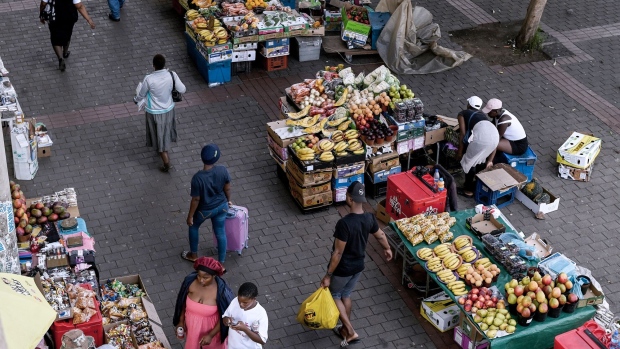Jun 19, 2024
South Africa to Maintain Rate Pause as Inflation Holds Steady
, Bloomberg News

(Bloomberg) -- South Africa’s inflation rate flatlined in May, increasing the likelihood that the central bank will keep borrowing costs on hold.
Consumer prices rose an annual 5.2% last month, the same as in April, Pretoria-based Statistics South Africa said Wednesday in a statement on its website. That matched the median of 14 economists’ estimates in a Bloomberg survey.
The reading will probably persuade the six-member monetary policy committee, which meets mid-July, to keep the benchmark rate at a 15-year high of 8.25% for a seventh straight meeting. Governor Lesetja Kganyago has consistently expressed concern that the inflation rate isn’t receding as much as the MPC would like and that borrowing costs will only be lowered when it is firmly at the midpoint of the 3% to 6% target range.
He also vowed earlier this month to continue tackling inflation despite the outcome of May 29 elections that saw the African National Congress lose its parliamentary majority for the first time since 1994.
“We will continue to deliver on that mandate, irrespective of how our post-election politics plays out,” Kganyago told an audience in Soweto, south of Johannesburg. “The only impact is what kind of policies will any coalition come with. If the policies are not sustainable, we might not have investment.”
Rate Cut
Still, while money markets are assigning a small chance of a 25-basis point rate cut at the MPC’s July meeting, it is fully pricing in one for November and a 70% chance of a 50-basis point reduction. Yvonne Mhango, Bloomberg Africa economist, also expects the rate-cutting cycle to commence in the fourth quarter.
A sharp drop in gasoline prices in June and a rally in the rand are expected to cool inflation. The rand has gained more than 3% since Friday, after the ANC agreed to a power-sharing deal with business-friendly opposition parties and Cyril Ramaphosa was re-elected as president.
Annual inflation rates for four of 12 product groups remained steady between April and May, including food & non-alcoholic beverages, the statistics agency said. Higher rates were recorded for transport, alcoholic beverages & tobacco and recreation & culture, it added.
Food prices increased 4.3% in May from 4.4% a month earlier while transport costs climbed 6.3%, from 5.7%, the highest rate for the category since October 2023.
--With assistance from Simbarashe Gumbo and Colleen Goko.
(Updates with details from fourth paragraph)
©2024 Bloomberg L.P.







